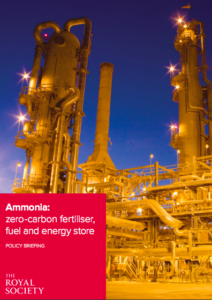 Converting high carbon diesel engines in ships to run on clean ammonia would slash carbon emissions, according to a report from the world’s oldest scientific institution. The Royal Society says ‘green’ ammonia could also fuel district heating and provide energy storage.
Converting high carbon diesel engines in ships to run on clean ammonia would slash carbon emissions, according to a report from the world’s oldest scientific institution. The Royal Society says ‘green’ ammonia could also fuel district heating and provide energy storage.
The policy briefing states that chilled ammonia made with green electricity can easily adopted as a fuel, and pumped over existing pipes and distribution infrastructure. Converting marine diesel engines to power bulk cargo carriers will be relatively cheap and simple, researchers suggest.
The world’s diesel-powered shipping fleets account for two per cent global greenhouse emissions, as much as the entire German economy.
Widespread in fertilisers, explosives, drugs and refrigerants, ammonia has been pondered as a replacement for diesel, but rejected due to its high CO2 emissions when conventionally made. Ammonia production now accounts for 1.8 per cent of global GHGs, the RS notes.
What’s changed, say researchers, are falling costs of green electricity needed to produce ammonia, plus lower costs of storing the resulting carbon dioxide underground.
Critical to making green ammonia at industrial scale is the Haber-Bosch process. It treats nitrogen and electrolysed hydrogen with clean electricity, to yield high volumes.
Alongside shipping, other uses for more sustainable ammonia, says the RS, include energy storage for power generation and as a heat exchange medium for district heating systems.
Diesel engine builders are reporting interest in ammonia-powered conversions. One, Man Energy Solutions, hopes to have a new purpose-designed ammonia plant available to shipbuilders by 2024.
More in the RS’ report here.
Related stories:
Ørsted eyes hydrogen investments
Vattenfall backs hydrogen to decarbonise heavy industry, wants to own supply chain
ITM Power to open ‘world’s biggest’ electrolyser factory in Sheffield
Green hydrogen: How to get there
Net Zero: How to decarbonise heat?
Click here to see if you qualify for a free subscription to the print edition or to renew.
Follow us at @EnergystMedia. For regular bulletins, sign up for the free newsletter.




Ammonia ! How toxic? How much ammonia produced in the World is carbon neutral? 1%???